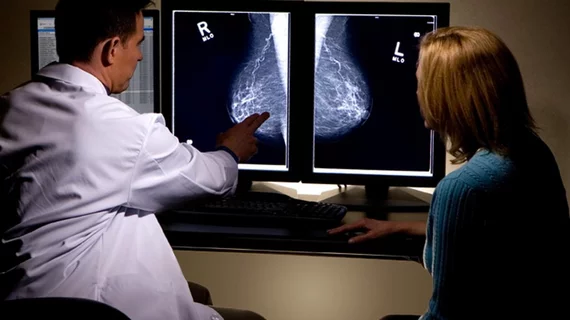AI-based mammo screening protocol reduces radiologist workload by 62%
Experts are once again highlighting the benefits of artificial intelligence (AI) in the field of radiology, citing that an AI-based mammogram screening protocol has similar sensitivity to radiologists for cancer detection.
Screening mammograms account for a substantial amount of a radiologists’ workload. Although screening mammograms are known to reduce breast cancer mortality, the majority of exams are negative. In these low prevalence conditions radiologists are more likely to miss subtle signs of malignancy, resulting in increased rates of false-negative reads. Artificial intelligence systems have proven their benefit as a complimentary decision support tool in these scenarios when radiologists are overburdened with mounting workloads.
This was the case in a new retrospective simulation study published recently in Radiology.[1] In it, researchers reported that an artificial intelligence system was able to interpret more than 114,000 screening mammograms using a reading protocol with high sensitivity and specificity, which resulted in a 62.6% workload reduction for radiologists.
“Such systems may also improve the performance and productivity of radiologists when used to support decisions,” corresponding author Martin Lillholm, from the Department of Computer Science at the University of Copenhagen in Denmark, and co-authors explained. “These circumstances motivate investigations into making population-based screening programs more effective using AI and potentially improving screening outcomes, while maintaining an equally high safety level for screened women.”
The AI system detected normal, moderate-risk, and suspicious mammograms consistent with two radiologists. Using the system, the mammograms were scored from 0 to 10 for risk of malignancy, with the higher scores correlating to increased risk. During the simulation, mammograms with scores less than 5 (considered normal) were excluded from radiologist reads. Suspicious mammograms were recalled, and the protocol was also applied to each BI-RADS density.
The AI-based screening sensitivity was 69.7% compared to 70.8% for the radiologists. The AI system did outperform radiologists when it came to specificity at 98.6% compared to 98.1%, and its use resulted in 25.1% fewer false positives. These results remained consistent across BI-RADS densities as well, though performance did decrease as density increased, which was to be expected, the authors said.
“The protocol is adjustable, by changing the thresholds, to yield more conservative screening or to match a desired recall rate,” the authors wrote. “This might support resource-limited and/or single-reader programs or programs with nonspecialized radiologists. For highly specialized radiologists, it might increase the reading time for high-risk mammograms.”
The full study can be viewed in Radiology.
Related Artificial Intelligence in Radiology Content:
Algorithm performs at expert level when distinguishing between benign and malignant ovarian tumors
Lack of diverse datasets in AI research puts patients at risk, experts suggest
AI assists radiologists in detecting fractures, improves workflow
Reference:

